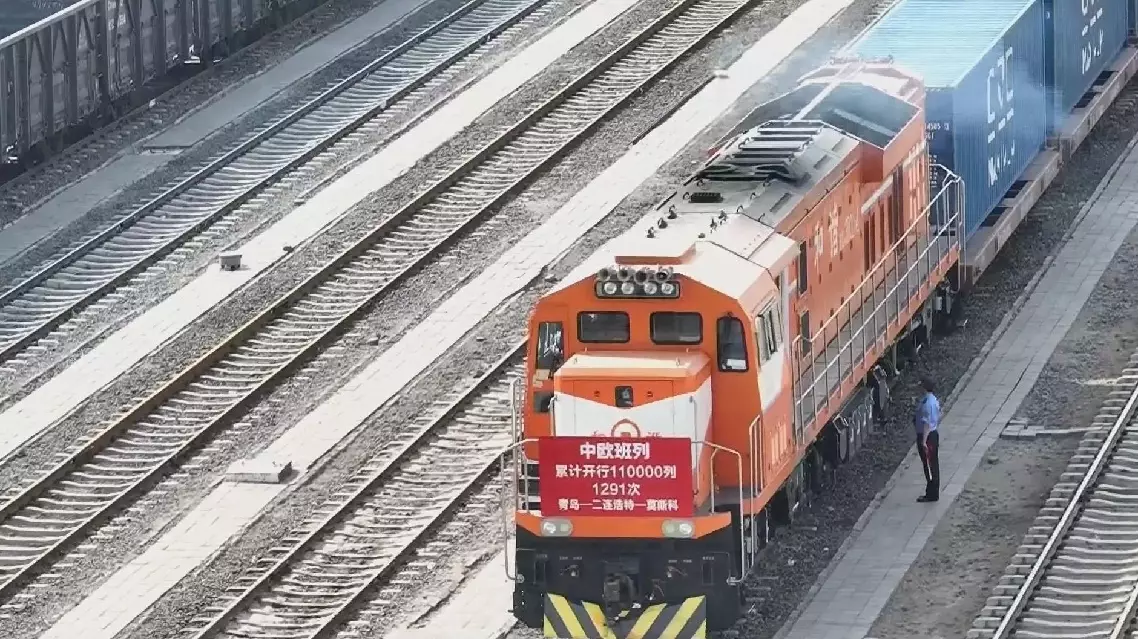The 110,000th China-Europe freight train on Thursday departed from Erenhot, one of China's key border railway hubs in north China's Inner Mongolia Autonomous Region, and embarked on an international journey towards Moscow.
The Erenhot port now connects with over 70 logistics hubs across more than 10 European and Central Asian countries, including Germany, Poland, and Russia. The port has handled over 19,000 China-Europe freight trains so far, playing a good role in boosting economic growth in related regions.
Local authorities have leveraged transporting capabilities of the freight trains and the connected cross-border logistics network to attract companies from industries including iron ore and timber processing to gather in Erenhot. As a result, a third of the imported iron ore powder is processed by local companies and transported across China.
"We process imported iron ore powder by leveraging the transportation capacities of the railway and return trips of China-Europe freight trains. This not only extends our local iron ore processing industry's value chain, but also helps deal with the challenges of transporting iron ore powder and the ensuing environmental pollution," said Yang Feng, head of an iron ore refining enterprise in Erenhot.
Located over 300 kilometers from the Erenhot port, Qisumu International Logistics Park is the largest China-Europe freight train dispatch hub in Inner Mongolia.
Local specialty agricultural products such as sunflower seeds and pumpkin seeds are all shipped to European markets via the railway. Since 2016, nearly 900 China-Europe trains have departed from the logistics park, boosting its establishment as an export processing industrial base for characteristic agricultural and livestock products.
"With the regular operation of the China-Europe Railway, the transportation time for our products to Europe has been reduced from 45 days to 15 days, saving approximately 600 yuan (about 83.4 U.S. dollars) per ton in logistics costs. This has laid a solid foundation for the development of locally distinctive agricultural product industry," said Cui Xuesong, a manager of Qisumu International Logistics Park.
Linking 128 Chinese cities with hundreds of European and Asian cities, the China-Europe freight train service has transported more than 450 billion U.S. dollars worth of commodities in its 14 years of service.

China-Europe freight train services boost regional economic growth in Inner Mongolia
The Iranian government is focusing on public concerns and maintaining stable supplies of essential goods amid recent protests, Iranian President Masoud Pezeshkian said in a televised interview on Sunday.
In the city of Karaj, northwest of the capital Tehran, daily life has largely continued as normal. A video filmed by a local resident on Sunday shows food stores open and grocery shelves fully stocked.
"This is the block near my home, and there are some food stores here. Daily life continues here. Last night we did not see many protests in Karaj. Right now the city is very safe. This is a grocery store close to my home. All the food is available; nothing is in shortage. Here are noodles and different types of beans. Here are dairy products, cheese, and yogurt. I also checked other grocery stores and didn't see any shortages. Everything is available," said local resident Ali Reza.
Iranian officials have described recent disturbances as acts orchestrated by the "enemy," including some carried out by well-trained and armed "terrorists." The incidents have caused casualties among security personnel and civilians, as well as property damage.
The Secretary of Iran's Supreme National Security Council Ali Larijani has directed authorities to severely punish the "terrorists."
Meanwhile, Iran's police chief Ahmad-Reza Radan said on Sunday that the police had raised alert levels and arrested several leaders of the troublemakers during the operations on Saturday.
President Pezeshkian noted in the interview that the normal demands of the Iranian people are reasonable and justified, but they must realize that triggering riots and carrying out terrorist acts are the enemy's attempts to undermine the country. He urged the public to remain vigilant.
Also on Sunday, Iranian Parliament Speaker Mohammad Baqer Qalibaf warned that Tehran would regard U.S. and Israeli bases and facilities in the Middle East as "legitimate targets" if Washington takes military action against Iran. His remarks followed media reports saying U.S. President Donald Trump is "seriously considering authorizing a strike" against Iran.
Iranian state media reported that at least 109 members of Iran's security forces have been killed in clashes since the protests began 14 days ago. Meanwhile, human rights groups based outside the country said the number of protesters killed has exceeded 200, though the figure could not be independently verified.
The protests initially erupted over a sharp depreciation of the rial and sweeping subsidy reforms. Iranian authorities have blamed the unrest on foreign-linked agents and sanctions imposed by the United States.

Iranian president says government focusing on ensuring supplies amid protests










